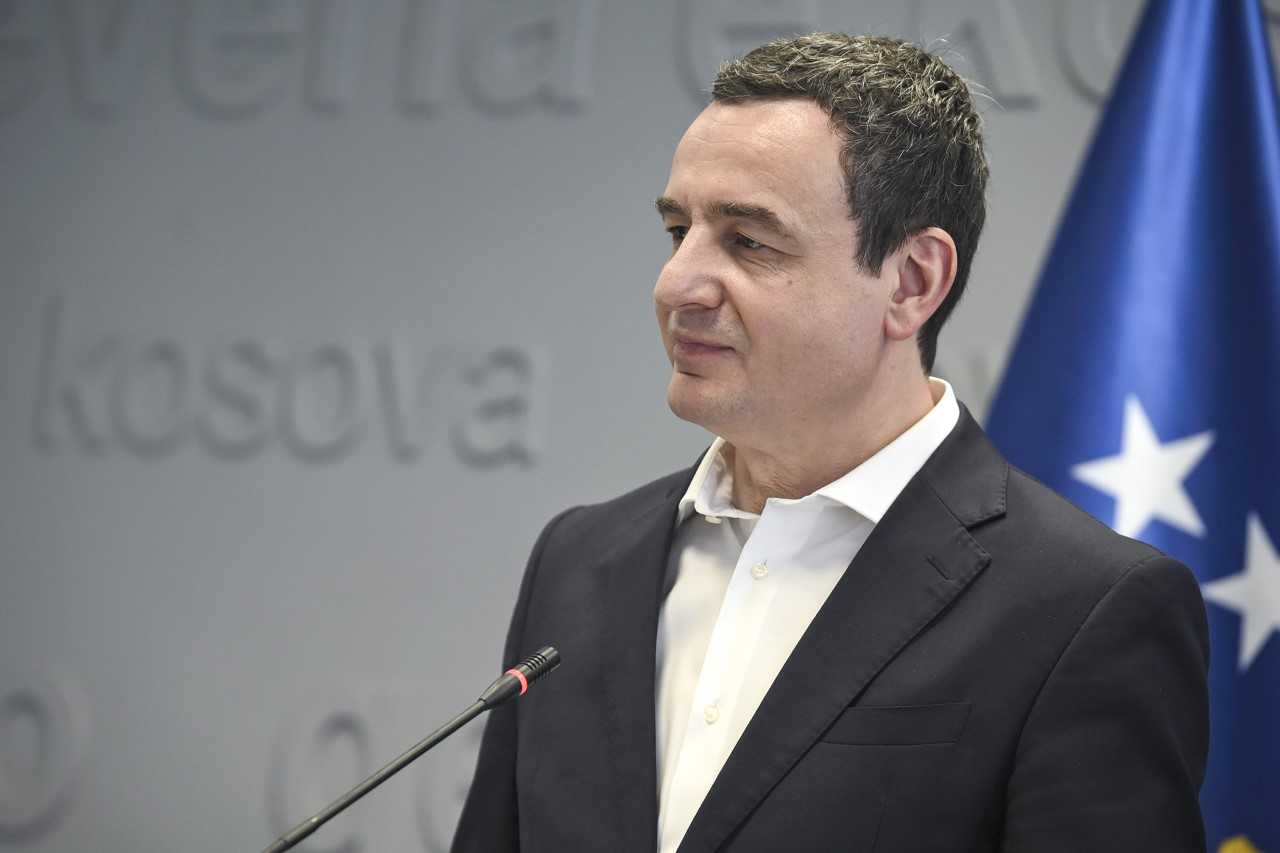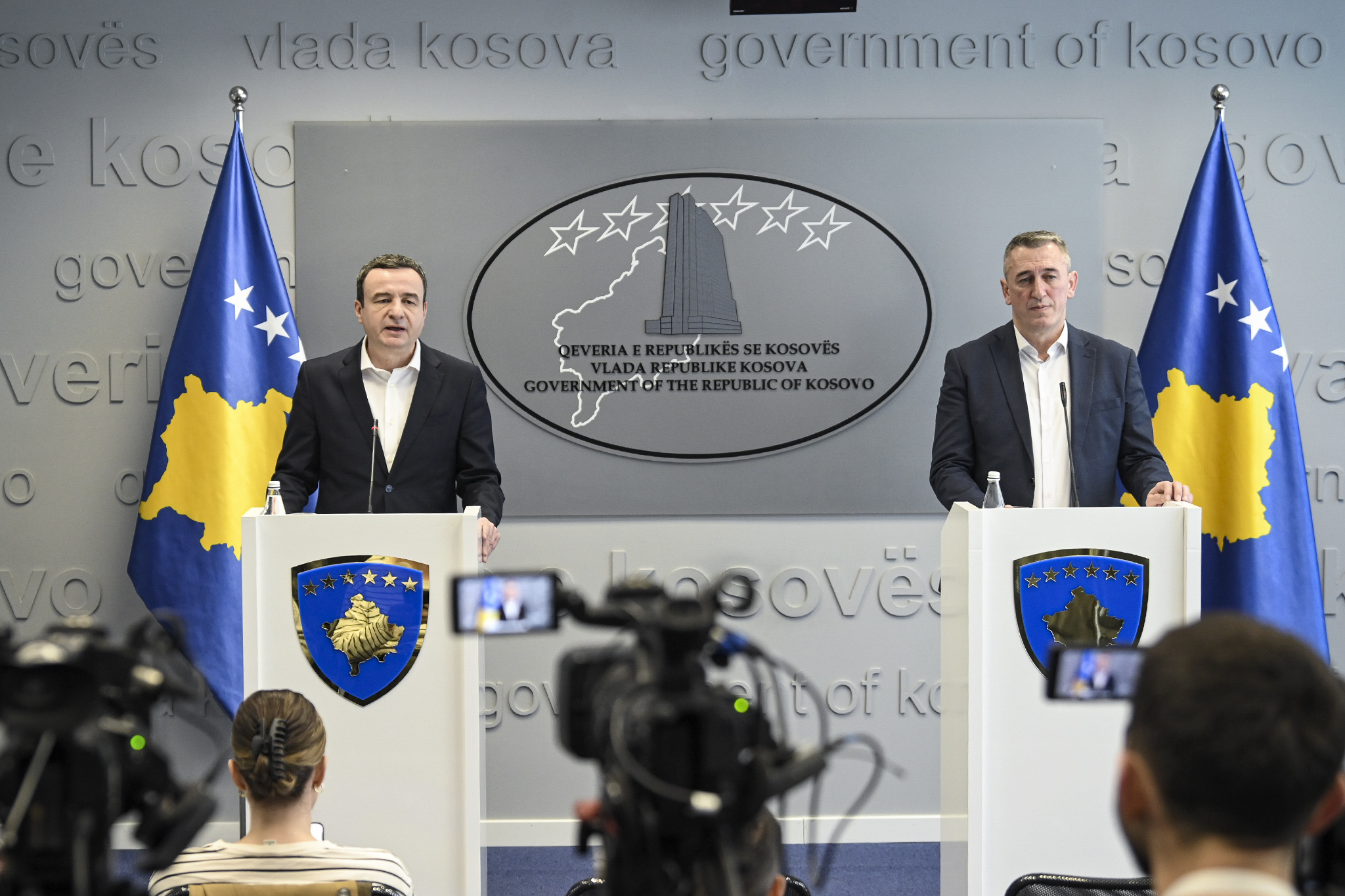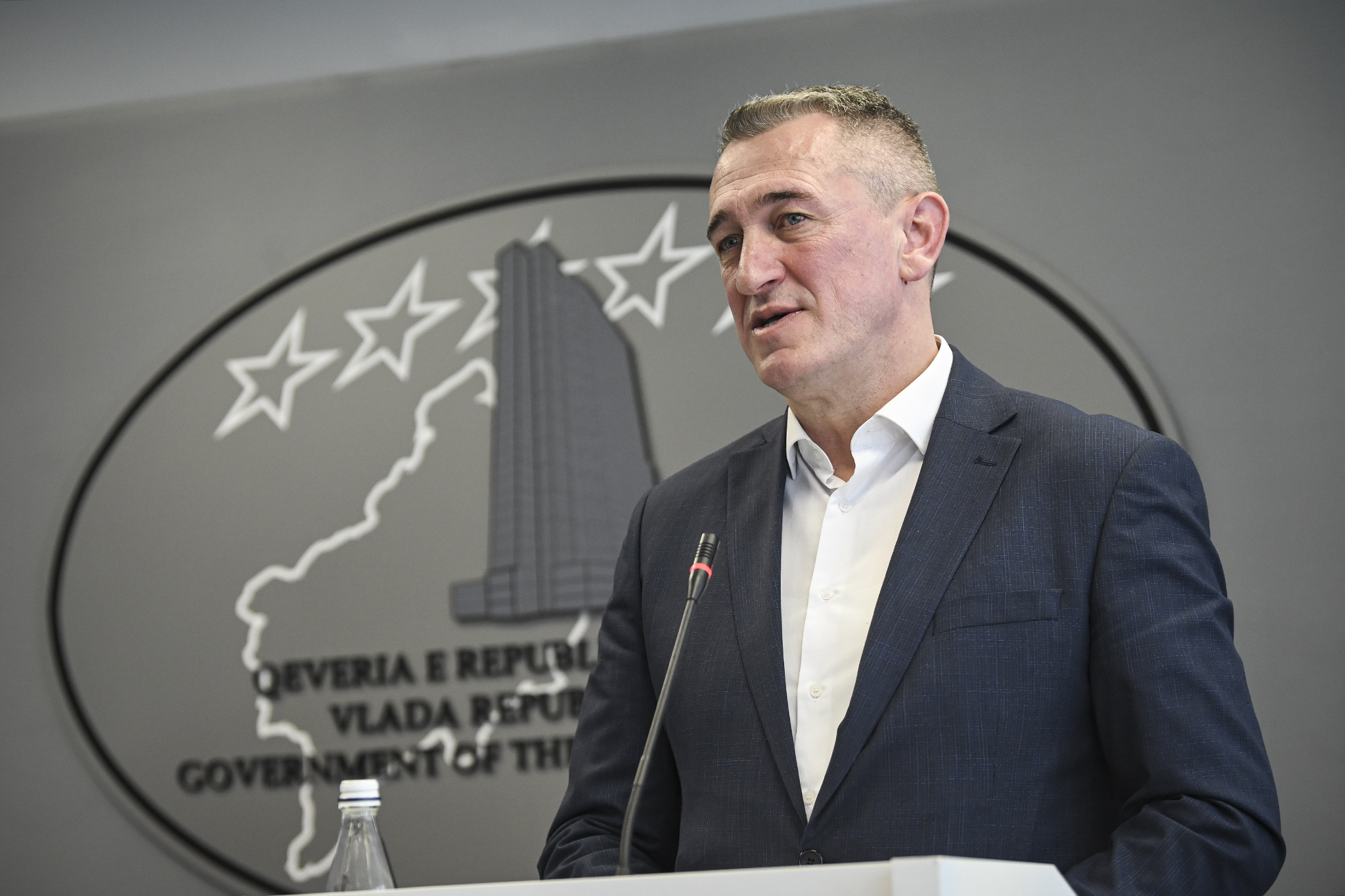Prishtina, 9 March 2025
Honorable journalists and other media professionals,
Dear citizens,
Serbia’s interference in our parliamentary elections is a violation on the democracy and sovereignty of the Republic of Kosovo. It has influenced the selection of Serbian and non-Serb minority deputies, who are under the complete control of the President of Serbia, Aleksandar Vucic, the government, intelligence services, and organized crime there. Thus, Serbia seeks to hold our country hostage not only in its internal political development but also in the advancement of international relations.
In the last elections, the forms of interference have changed due to the significant improvement in the security situation in the four northern municipalities as a result of the enforcement of law and order, the successful fight against criminal and terrorist groups, and the closure of illegal structures. The previous brutal physical interference, including beatings and murders, was no longer feasible. As a substitute, other forms of hybrid threats have increased—mainly financial inducements and conditionality, blackmail, intimidation, and threats, as well as cyberattacks.
The President of Serbia himself has encouraged every Serbian state and non-state actor to get involved in Kosovo’s elections. For this purpose, the executive role has been held by the chief terrorist Millan Radoicic, the person who has taken on tasks for Kosovo from the President of Serbia.
The Serbian state apparatus has made extraordinary efforts to damage rival Serbian entities, particularly the party For Freedom, Justice, and Survival (Za Slobodu i Pravdu Opstanak – SPO) of Nenad Rashiq, our Minister for Communities and Returns, and Serbian Democracy (Srpska Demokratija) of Aleksandar Arsenijević, as well as voters of other community entities, mainly Roma and Ashkali.
Certain representatives from almost all other Serbian political entities have withdrawn from the race following the threats they received. These cases have been recorded in the four northern municipalities as well as in the six other Serb-majority municipalities in Kosovo. For most of these cases, our institutions have evidence, which, for the sake of the privacy and security of Serb citizens, is not beneficial to make public.
Our law enforcement agencies, based on testimonies from several members of the Serb community indicating direct interference in the electoral process, on 21 February of this year, raided and shut down several of the so-called “Centers for Social Affairs” in the four northern municipalities. These were used to lure or blackmail voters from the Serb community into voting for the Serb List.
In this interference scheme, we have identified seven Serbian state and non-state actors:
1. The President of Serbia, Aleksandar Vucic
2. The chief terrorist, Millan Radoicic
3. The director of the so-called Serbian Office for Kosovo, Petar Petkovic
4. The Serbian Intelligence Agency BIA
5. Serbian media controlled by the government in Belgrade
6. The Serb List
7. Illegal structures, including the Postal Savings Bank, Social Centers, Pension Offices, MTS/Telekom Serbia, as well as former members of the Kosovo Police.
At least 10 methods have been used:
1. Financial inducement, through financial support of 20,000 dinars or approximately 170 euros on a monthly basis for all unemployed adults.
2. Financial conditionality, by threatening the loss of financial benefits, including salaries, pensions, child allowances, social assistance, and others.
3. Division of the Serb List’s rivals.
4. Blackmail and pressure to prevent support for any entity other than the Serb List.
5. Threats to leave the Polling Station Councils.
6. Registration of so-called “secure voters”, specifically the compilation of designated lists of “secure voters” from their perspective.
7. Organized transport of voters from Serbia to Kosovo.
8. Organization of collective voting at polling stations.
9. Monitoring of voters on election day near polling stations.
10. Marking of ballots.
Interference through these at least 10 methods has been carried out in three phases:
1. Before the election campaign,
2. During the election campaign,
3. On election day until the completion of the electoral process.
In the first phase, that is, before the election campaign, the President of Serbia continuously declared that “only the Serb List protects Serbia in Kosovo.” He encouraged all other Serbian state and non-state actors to undermine the entire electoral process in the Republic of Kosovo. In addition, and for the same purpose, the President of Serbia authorized the chief terrorist Radoičić to develop the plan for interference in the parliamentary elections of 9 February. As part of this plan, lists of “secure voters” were compiled. Such lists contained at least 50 individuals—”secure voters.” According to the order, these so-called “secure voters” were threatened that if they did not vote for the Serb List, they would face consequences. Members of Serbian illegal structures were threatened by Millan Radoičić, through Ivan Zaporozac, the head of the illegal municipality of Mitrovica, to report all individuals who refused to vote for the Serb List, to sign the so-called “secure vote” lists, or to declare that they would boycott the elections.
In addition to the “secure voters” list, a list of seven mandatory candidates from the Serb List was dictated. Thus, Belgrade compiled a list where seven candidates had to be voted for, while three others were left for citizens to decide. The list included the following names: Zlatan Elek, Slavko Simic, Igor Simic, Branislav Nikolic, Verica Ceranic, Srdjan Popovic, Ljiljana Stefanovic. All of them were elected. Each of the seven preferred candidates of the chief terrorist Millan Radoičić received at least 2,000 more votes than the others.
Alongside securing support for the Serb List from Serbian voters, the interference plan in these elections also included expanding the vote base for the Serb List from non-Serb minority communities. Therefore, it was ordered that the political entity from the Roma community, Romani Initiative, should not participate in the elections at all and that the same entity should support the Serb List.
Furthermore, opposition deputies in the Parliament of Serbia, originating from Kosovo, were also involved in external interference in our parliamentary elections. Zarko Ristic, under the instructions and directives of Serbian intelligence services and the government in Belgrade, played a role in dividing the leaders of other Serbian parties that were rivals of the Serb List, at a time when these parties were preparing their election campaigns. Ristić, while pretending to unite them into a single list, in reality, did the exact opposite – he divided them; in the name of unity, he fragmented them. A potential unification into a single list would have substantially jeopardized the mandates of the Serb List.
The Serbian BIA was also engaged in this matter by forcing certain candidates to align with Serbia’s interests through pressure and threats of arrest for those who did not comply with orders.
Branches of the “Postal Savings Bank/Postanska Banka Stedionica” operating near Kosovo-Serbia border crossings were instructed to register all Serbs withdrawing money from this bank. These compiled records were then handed over to the head of the so-called Office for Kosovo, Petar Petkovic, to be used for blackmailing individuals into voting for the Serb List.
In the second phase, during the campaign, financial inducements and threats against political opponents of the Serb List were dominant. Financial inducement was carried out through a social support plan for individuals who were not beneficiaries of various forms of assistance from Serbia. This plan was scheduled to begin in February 2025 – precisely when the elections were taking place – with a predetermined amount of 20,000 dinars or approximately 170 euros. This was not support for the citizens. In fact, it was a financial package designed to condition the vote of Serb community members in favor of the Serb List and to interfere in our parliamentary elections. Voters benefiting from these social schemes had their identification cards photographed, and at the same time, they received blackmail messages stating that “if the Serb List is not voted for, all salaries and other benefits received from Serbia will be cut off.” This method of vote conditioning and pressure on voters through threats of cutting off social benefits was also documented in the report of the European Union Election Observation Mission.
Instances of direct threats against members of Polling Station Councils from other Serbian entities, rivals of the Serb List, were also recorded in the Peja region. They were threatened to resign from their positions or face direct consequences, including the suspension of all income they receive from Serbia. Moreover, they were warned that if they reported these incidents to the police, they would face even greater consequences, including threats to their family members. On 22 January 2025, unknown individuals damaged election posters in North Mitrovica and Zvecan belonging to the political entity Srpska Demokratija – Serbian Democracy of Aleksandar Arsenijevic. In Kllokot, late on 24 January 2025, a Molotov cocktail attack was carried out against the banner of candidate Divna Bojic Andreus from the political entity Srpski Narodni Pokret – Serbian People’s Movement.
Meanwhile, the Minister for Communities and Returns, Mr. Nenad Rasic, has been continuously threatened by Millan Radoicic and his close associates, who have attempted to blackmail him through various fabrications aimed at damaging his reputation among Serb voters and forcing him to withdraw from the race. He and the ministry he leads have also been targeted by cyberattacks, during which both Nenad Rashiq’s personal profile and the ministry’s social media accounts were hacked.
The third phase of interference in our elections included the organized transport of voters from Serbia to Kosovo, the collective voting arrangement at polling stations, the monitoring of voters on election day near polling stations, and the marking of ballots.
Near polling stations in Serb-majority municipalities, particularly in the four northern municipalities, individuals were present who exerted pressure on Serb voters. The majority of them were former police officers who had resigned in November 2022. In the municipality of Shtërpcë, certain individuals attempted to use large financial promises to influence those with access to the electoral process in order to manipulate and annul hundreds of votes cast for political entities that were rivals of the Serb List. Additionally, with the aim of mobilizing and pressuring Serb voters, a strict decision was made to cancel all annual leave during the election period, and all citizens who were in Serbia were ordered to return to Kosovo.
Throughout this scheme, Serbian media controlled by the official authorities in Belgrade and disinformation campaigns have been key elements. The President of Serbia, Vučić, has been the person who exerted the greatest influence on Serbian media when it came to discussing elections in Kosovo. His public and political rhetoric has encouraged every Serbian state and non-state actor to participate in interfering in Kosovo’s parliamentary elections.
The media controlled by the government in Belgrade not only reported in a biased manner in favor of the Serb List but also spread disinformation and manipulated content. The three main narratives of these media during these elections have been: first, that the rivals of the Serb List are servants of the Albanians; second, that only the Serb List preserves the Serbian identity in Kosovo; and third, that the Government of the Republic of Kosovo and I, as Prime Minister, want a Kosovo without Serbs.
These false narratives and the aggressive media campaign were driven by Serbian officials and politicians such as Petar Petkovic, as well as figures we know very well from the apartheid era in Kosovo in the 1990s, such as Milovan Drecun and Zoran Anđelkovic.
Additionally, in the informational warfare against the electoral process, Russian media were also involved, specifically two state-owned Russian media outlets in Serbia: Sputnik Srbija and Russia Today Balkan.
The European Union Election Observation Mission, in its preliminary report, among other findings, highlights that Russia Today Balkan and Sputnik Srbija, supported by Russia, published around 60 articles about the elections, some of which contained narratives alleging manipulations against the Serb community. The same report emphasizes the dominant media coverage of the Serb List by Serbian media in Serbia and local Serbian media in Kosovo, in contrast to other Serbian parties and politicians in Kosovo.
Honorable journalists, dear citizens,
In conclusion, I want to emphasize that despite this entire scheme and the engineering of Serbian state and non-state actors to dictate the political representation of the Serb community in Kosovo, around 20 percent of Serb voters still voted for parties other than the Serb List.
For the past four years, it has been established that Serbia no longer holds elections or referendums in Kosovo, and while the 9 February 2025 elections have demonstrated Serbia’s interference in the electoral process, they have also shown a decline in Serbia’s influence over the Serb citizens of the Republic of Kosovo. Thus, it can be said that despite Serbia’s influence, these elections have demonstrated the emergence of political pluralism among Serbs in Kosovo. Meanwhile, the number of Serb citizens who participated in the elections has definitively dismantled Serbia’s aggressive propaganda in recent years, which falsely claimed a mass exodus of Serbs from Kosovo. This, of course, is not true.
Thank you.
Last modified: March 12, 2025


